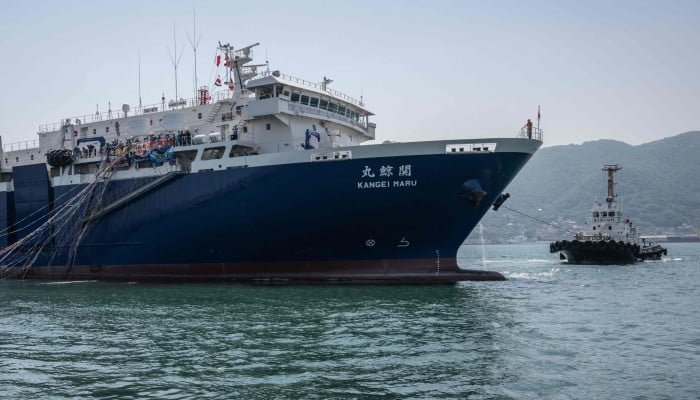
Japan recently unveiled its first whaling vessel in 73 years.
Japan Unveils First Whaling Vessel in 73 Years
Japan’s Whaling Industry: A Controversial Comeback
After a hiatus of 73 years, Japan has recently unveiled its first whaling vessel, marking a controversial comeback for the country’s whaling industry. This move has sparked intense debate and raised concerns among environmentalists and animal rights activists worldwide. While Japan argues that its whaling activities are for scientific research purposes, critics argue that it is a thinly veiled attempt to resume commercial whaling.
Japan’s whaling history dates back centuries, with the industry playing a significant role in the country’s economy and culture. However, in 1946, following the end of World War II, Japan agreed to halt commercial whaling under the International Convention for the Regulation of Whaling. This decision was made in response to the declining whale populations and the need for conservation efforts.
For decades, Japan continued to engage in whaling under the guise of scientific research, exploiting a loophole in the international ban. Critics argue that this was merely a cover for commercial whaling, as the meat from the captured whales would often end up in markets and restaurants. Environmentalists and animal rights activists have long condemned Japan’s whaling practices, citing the cruelty inflicted upon these majestic creatures and the negative impact on marine ecosystems.
In 2018, Japan announced its withdrawal from the International Whaling Commission (IWC), a move that further fueled concerns about the country’s intentions. The IWC is an international body responsible for the conservation of whales and the management of whaling activities. Japan’s decision to leave the commission was seen by many as a clear indication of its desire to resume commercial whaling without international oversight.
The unveiling of Japan’s new whaling vessel, named Nisshin Maru II, has intensified the debate surrounding the country’s whaling industry. The vessel is equipped with state-of-the-art technology and is expected to play a crucial role in Japan’s whaling operations. While Japan claims that its whaling activities are necessary for scientific research, critics argue that there are alternative methods available that do not involve killing whales.
The resumption of Japan’s whaling activities has drawn widespread condemnation from various countries and organizations. Australia, a staunch opponent of whaling, has expressed its disappointment and called on Japan to reconsider its decision. The Australian government has long been at the forefront of efforts to protect whales and has even taken legal action against Japan’s whaling practices in the past.
The controversy surrounding Japan’s whaling industry highlights the ongoing struggle between economic interests and environmental conservation. Proponents of whaling argue that it is an important cultural tradition and a vital source of income for coastal communities. They believe that sustainable whaling practices can coexist with conservation efforts, ensuring the survival of both the industry and the whale populations.
However, opponents argue that the economic benefits of whaling are outweighed by the ethical and environmental concerns. They argue that the killing of whales for profit is inherently cruel and unnecessary, given the availability of alternative sources of income for coastal communities. Furthermore, they emphasize the importance of protecting these magnificent creatures and preserving the delicate balance of marine ecosystems.
As the debate rages on, it remains to be seen how Japan’s whaling industry will evolve in the coming years. The international community’s response and the pressure exerted by environmental organizations will undoubtedly play a significant role in shaping the future of whaling in Japan. Ultimately, finding a balance between cultural traditions, economic interests, and environmental conservation will be crucial in determining the fate of these majestic creatures and the industry that surrounds them.
In conclusion, Japan has recently unveiled its first whaling vessel in 73 years.
https://japan-forward.com/japans-first-whaling-mothership-in-73-years-sets-sail/
https://www.undercurrentnews.com/2024/05/06/japan-builds-first-whaling-mothership-in-73-years/
Japan has launched a new whaling vessel to modernize its fleet and continue its controversial practice of whaling, which it argues is part of its cultural heritage and necessary for scientific research.
The new whaling vessel is equipped with advanced technology for hunting and processing whales, aiming to increase efficiency and safety compared to older ships.
The international community, particularly environmental and animal rights organizations, has largely condemned Japan’s move, calling for an end to whaling and emphasizing the need to protect whale populations.
Japan justifies its whaling practices by citing cultural traditions, the need for scientific research to manage whale populations, and providing whale meat for domestic consumption.
The introduction of a modern whaling vessel may increase the efficiency of whale hunts, potentially leading to higher catch numbers and raising concerns about the sustainability of whale populations.
Washoku, the term for traditional Japanese cuisine, represents a profound aspect of Japan’s rich cultural…
BVE Train Simulator, often simply known as BVE, is a highly realistic train simulation game…
The Queen's Pawn Game, classified under the code D00 in the Encyclopedia of Chess Openings…
Shinjuku, a bustling district in Tokyo, is renowned for its vibrant nightlife, skyscrapers, and extensive…
Ukai, or cormorant fishing, is a captivating and ancient Japanese tradition that dates back over…
Japanese fishing communities are redefining their economic future by tapping into the "sea industry," a…